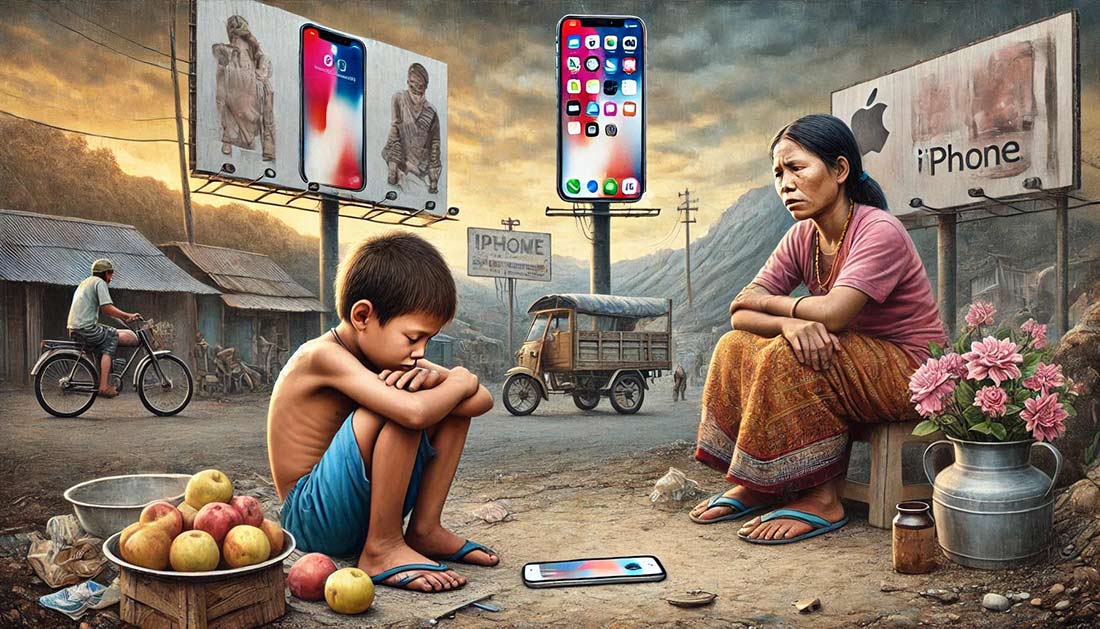Viral Video of a Boy Refusing to Eat for iPhone: A Reflection on Society and Consumerism
A viral video of an Indian boy refusing to eat until his mother, a flower seller, bought him an iPhone has sparked widespread discussion.
In an era where materialism often overshadows values like empathy and responsibility, a recent viral video has sparked a broader conversation about consumerism and its deep-rooted influence on society. The video, shared by journalist Abhishek on X, depicts a poignant moment where a mother, who earns her livelihood selling flowers outside a temple, is forced to give in to her son's demand for an iPhone after he went on a hunger strike for three days. The incident, though seemingly isolated, serves as a stark reflection of the pervasive culture of consumerism that has taken hold of modern society.
The Incident: A Microcosm of Consumerist Values
In the video, the boy can be seen holding a wad of cash, while his mother, visibly distressed, explains that she was compelled to buy the phone because her son refused to eat until his demand was met. Despite her compliance, the mother expressed her hope that her son would earn back the money spent on the phone, highlighting a poignant disconnect between her values and her son's expectations.
This incident has ignited a firestorm of criticism online, with many condemning the boy's apparent lack of appreciation for his mother's hard work. However, beyond the immediate reactions, this scenario underscores a more significant issue: the societal pressures and values that drive such behavior.
The Culture of Consumerism: Origins and Impact
Consumerism, defined as the preoccupation with and inclination toward buying consumer goods, is not a new phenomenon. It has its roots in the industrial revolution when mass production made goods more accessible to the general public. However, the 20th and 21st centuries have seen an unprecedented acceleration of consumerist culture, fueled by advances in technology, advertising, and global capitalism.
Research in psychology and sociology has shown that consumerism is not merely about acquiring goods; it is deeply tied to identity, self-worth, and social status. The desire to own the latest gadgets, wear branded clothing, or drive luxurious cars is often driven by an underlying need to fit in, gain social approval, or assert one's status. This is particularly evident in younger generations, who are often more susceptible to the influences of social media and advertising.
Scientific Perspectives on Consumerism
Numerous studies have delved into the psychological and social implications of consumerism. For instance, research published in the Journal of Consumer Research suggests that materialistic values are often linked to lower life satisfaction and increased anxiety. The constant pursuit of material goods can lead to a cycle of temporary happiness followed by dissatisfaction, as the novelty of new purchases quickly wears off.
Moreover, a study by Tim Kasser, a psychologist known for his work on materialism and well-being, found that individuals who prioritize materialistic goals tend to have poorer psychological health, including higher levels of depression and anxiety. Kasser argues that consumer culture perpetuates a "toxic" value system, where people are encouraged to seek happiness and fulfillment through material possessions rather than through relationships, personal growth, or community involvement.
The Role of Society and Media
Society and media play a pivotal role in shaping consumer behavior. The proliferation of social media platforms has created a new arena where consumerist values are not just promoted but celebrated. Influencers and celebrities often showcase their luxurious lifestyles, complete with the latest gadgets, designer clothes, and exotic vacations, creating a sense of envy and desire among their followers. This "Instagram effect" has been shown to exacerbate materialistic tendencies, particularly among younger audiences who are more impressionable.
Advertising also plays a crucial role in reinforcing consumerist values. Marketers use sophisticated psychological techniques to create a sense of need and urgency around their products, often appealing to emotions rather than logic. The result is a culture where the acquisition of goods is seen as a path to happiness and success, rather than a means to an end.
The Societal Implications
The incident with the flower seller's son is a microcosm of a larger societal issue. It highlights how deeply ingrained consumerist values have become, to the point where a young boy is willing to go to extreme lengths to obtain a luxury item, regardless of the financial strain it places on his family. It also raises questions about the values being imparted to the younger generation and the role of parents, educators, and society in fostering a more balanced approach to material possessions.
Moreover, this incident brings to light the economic disparities that are often exacerbated by consumerism. The pressure to own the latest technology or fashion can be particularly burdensome for those in lower-income brackets, leading to financial strain, debt, and even unethical behavior. In the case of the flower seller, her son’s demand for an iPhone represents not just a desire for a luxury item, but also the societal pressure to conform to a certain standard of living, even when it is beyond one's means.
Towards a More Balanced Approach
Addressing the culture of consumerism requires a multifaceted approach. Education plays a critical role in helping individuals develop a more balanced perspective on material possessions. This includes teaching financial literacy, promoting values like gratitude and contentment, and encouraging critical thinking about media and advertising.
There is also a need for a broader societal shift in how success and happiness are defined. Instead of equating these concepts with material wealth, society must place greater emphasis on relationships, personal growth, and community involvement. This shift can be supported by policies that promote economic equality, mental health awareness, and sustainable consumption.






